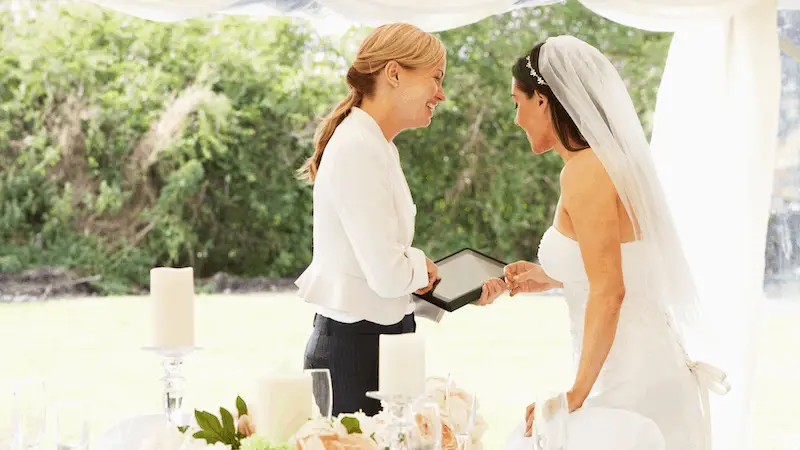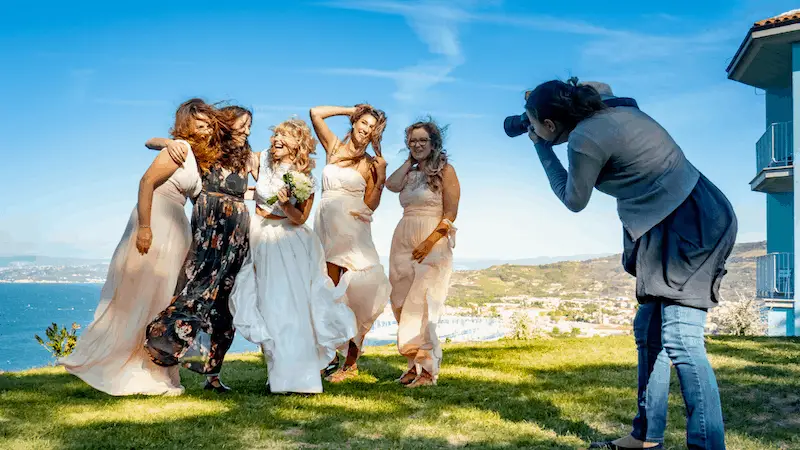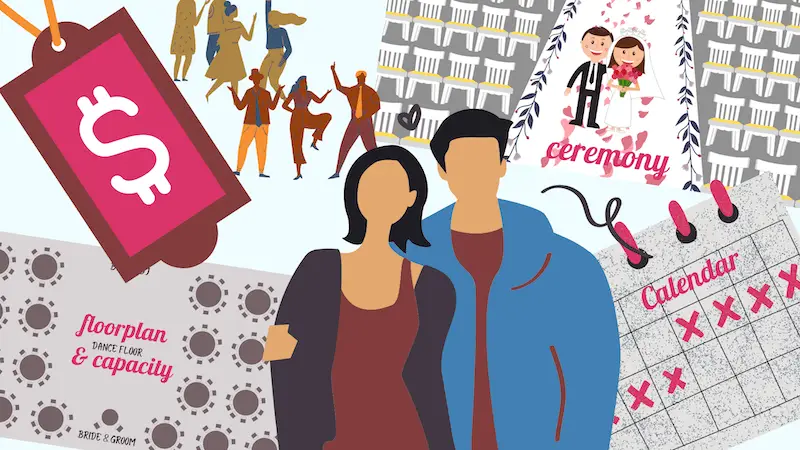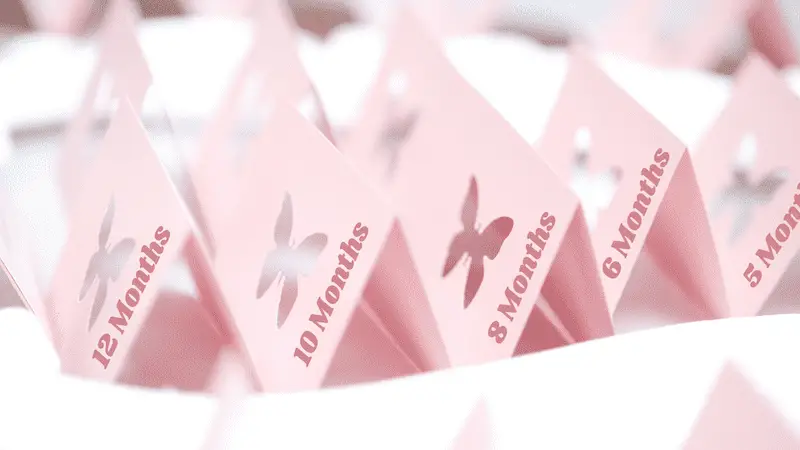What Are The First Steps To Planning A Wedding?
Planning a wedding is an exciting but also stressful process.
You are probably asking yourself how things will possibly fall into place as you go through the process.
How to start planning a wedding?
- Create a wedding budget.
- Pick a wedding date.
- Find a wedding planner or coordinator.
- Choose your wedding venue.
- Book your wedding vendors.
- Mail save-the-dates.
- Take engagement photos.
- Order wedding invitations.
- Pick your wedding dress and the groom’s tuxedo.
- Choose your wedding party.
- Set up your wedding registry.
We will now look at each step, and you’ll know what to do!
Create A Wedding Budget
The first step where to start when planning a wedding is to figure out your budget and decide what you can afford for the event.
This task is critical because it’s easy to underestimate how much money goes into catering and how many guests can be invited, how much goes into the venue fee, entertainment, bridal gown, tuxedo, and photographer, to name a few.
However, this step should give you a general idea and what kind of ballpark figure you are working with toward what type of wedding you are looking to have in terms of size and style and understand where to start researching.
When planning something so big, you don’t want to leave anything to chance, and you want to be prepared for everything.
When planning your wedding, keep in mind how many guests you will invite, as well as the cost per person. Be realistic about what you can afford.
Take the package price and multiply it by the total amount of people you want to invite. Add the service charge and taxes. Use this ballpark figure for your budget, which helps determine how much money you need to allocate toward your wedding venue.
You will be asked to guarantee a certain minimum number of guests at the venue.
A significant part of your costs depends on you controlling how many guests you invite and, eventually, how many guests will rsvp.
You hear in the events industry that about 10% to 15% will not rsvp, but it could be unwise to bank on it. Maybe you are so blessed, and everyone confirms that they are coming to your wedding.
Other aspects like the venue fee, entertainment, flowers, officiant, wedding dress, shoes, and tuxedo will also cost!
It might seem daunting, but it doesn’t have to feel overwhelming, and by taking one step after another, you will finally achieve whatever goal was set forth.
Pick A Wedding Date
After figuring out your budget and deciding on the type of wedding that fits your needs best, it’s time to pick a wedding date, or even better, a range of dates, so that you have a greater chance of finding a venue.
Once again, this can be a complex task because you may not know yet what dates are available at your venue or how picking a date will affect the number of guests that would be available to attend your wedding.
Consider other events happening around your desired date or any (religious) holidays during these months!
Some holidays are an excellent time to host your wedding, such as a three-day weekend, but it’s equally important to keep in mind that it may be difficult for your guests who have children or other commitments.
Besides, certain long weekends could also be expensive and inconvenient for them. Also, do not forget that these are already busy times.
Consider what type of wedding would work best based on the season and given who is coming. A summer event might invite more attendees than, say, winter nuptials at night.

Consider Hiring A Wedding Planner Or Coordinator To Help With The Planning Process
The next step in planning an event like a wedding, especially if the affair is large-scale or high-end with many moving parts, is to hire a wedding planner or at least a Day-Of Wedding Coordinator.
Professional wedding planners will help you create every detail of your wedding.
In addition to devising an hour-by-hour day-of-wedding-timeline, managing vendors, and coordinating the ceremony and reception details, this would also include creating a timeline for the months and weeks leading up to your wedding.
They’ll also iron out all those troublesome nitty gritty pieces to make everything run smoothly without any hiccups.
This is especially helpful if you are not experienced in event planning and have little time on your hands!
An expert wedding planner will take care of all aspects, from venue selection (including pricing) down through every detail, including table settings for both reception & dinner and any other details that may be important.
They will also handle coordinating vendors like the photographer, florist, band, or DJ who needs an access point during the celebration, rather than you having to do everything.
Choose Your Wedding Venue
Your wedding venue is an important decision because it will be the backdrop and stage to show off your wedding. It will also determine how much money you spend on other aspects of planning, like flowers, potentially upgrading the food and beverage package, and spending on lighting and entertainment, to name a few!
What kind of style do you like? A rustic chic country club or a hotel ballroom? Or a modern industrial loft space?
You’ll need enough room at this location so that guests are comfortable during the cocktail reception before heading into dinner & dance.
The venue’s size should also, if applicable, accommodate your wedding ceremony unless you have planned it off-site.

Book Your Wedding Vendors
Your wedding is one of the most important events of your life, and it can be overwhelming trying to plan all the details. Your vendors are experts who will help you create a photographic memory for years to come.
Online reviews and photos are the most helpful features for couples when contacting vendors, aside from price.
Your vendor list may include the venue, a florist, a photographer, a videographer, DJ or band, musicians for the ceremony, an officiant, a hairstylist, a makeup artist, and a wedding cake maker.
five tips for choosing the perfect wedding vendors:
1. Find a vendor who is reliable and has experience with weddings.
2. Ask friends and family members for recommendations and testimonials from companies they know and have used.
Look through the vendor’s portfolio to see if you like their work.
Musicians may let you or invite you to see them perform live at another event. Ensure that the host agrees to this; otherwise, don’t show up. Alternatively, you can get a general idea from the footage they have on their websites.
3. Choose vendors with good communication skills and responsiveness, especially if you are planning the event from afar. When you have questions before and during your wedding, you will want to be able to get in touch easily.
4. Find someone whose personality matches your own. You want to enjoy your wedding day and not worry about how the vendor is feeling or if they are having a good time too!
5. Find someone who has experience with weddings of your size and style (i.e., traditional vs non-tradition) and handle any other special requests you may have for them on the big day.
Mail Save-The-Dates To Your Wedding To Family And Friends
The Save-The-Date is a pre-invitation to your wedding, but that does not mean that they need to be sent out immediately after the engagement announcement.
Save sending out the Save-The-Date until about six months before the wedding.
Follow with the actual Invitations about two months before the wedding.
If you are doing a destination wedding, send out the save-the-dates eight to ten months before your wedding. Follow with the actual invitations three months in advance of your wedding.
Doing so will help your guests to have time to make travel arrangements and hotel reservations.
Although most of your family and friends probably already know about your engagement and have an idea of when and where the wedding will be, the pre-invitation still needs to be sent out to remind your guests about your upcoming wedding.
Moreover, suppose you are planning a destination wedding during a three-day-long holiday weekend. In this scenario, you are expected to send a Save-the-Date so that your guests can make accommodations well in advance of the event.
Take Engagement Photos
The engagement photo session is a great way to get comfortable in front of the camera with your partner and familiar with your photographer.
It’s also an opportunity for you, as bride and groom-to-be and photographer, to work out any hitches before the wedding day arrives!
The best time frame would depend on how soon after getting engaged, one wants photos taken; for example, less than six months from now, it may not make sense if you are running out of time planning your wedding and focusing on that.
Instead, just do some test shots before the wedding, which would allow you a quick practice without having too much pressure on the day of the wedding.
Order Wedding Invitations
Buy your invitations four to six months before your wedding so you have sufficient time to compile and address them before sending them out (six to eight weeks ahead of the wedding).
Make sure that your wedding RSVP deadline is something respected by everyone on the guest list. Otherwise, you’ll end up with inconsistent numbers, which will make planning a misery.
In the rush of getting married, it’s easy to forget about sending out wedding reply cards. So keep an eye on your calendar.
But non-returned RSVPs can throw you off, too.
Wedding invitations are forever followed by the dreaded follow-up process. A good rule of thumb is for a guest to respond within one week. But if you get no response, don’t panic!
Some guests choose to ignore your invitation altogether purely out of laziness or confusion of deciding on how they can be there and remain silent as long as they can! These are, of course, the exceptions.
Pick Your Wedding Dress And The Groom’s Wedding Suit
You deserve to look your best on your wedding day.
There are so many details that need to be taken care of, but in the end, you want everything to look perfect on your big day.
When it comes to the task of picking out your wedding dress or the groom’s suit, shoes, as well as bridesmaids’ dresses and suits for groomsmen, there are many things and important decisions that you will have to make.
Whether or not you want a traditional white gown and a black tuxedo for the groom – which is what most couples opt for these days – or something more daring.
Whatever color scheme you decide on, at any given time, there are hundreds if not thousands of options available from all different stores and designers.
Shopping for a wedding dress can be complex because they come in so many different styles, and since it is not an everyday dress, it’s hard to know what style would work best.
For example, the first step may be to decide on the style, fabric, and color. You may have a favorite designer in mind, or you can try on different styles until you find one that looks and feels great. i.e., if you are looking for a dress with lace detailing, go with a simple design that will allow those details to shine through.
But if your taste runs more towards something dramatic like an empire-waist gown, choose fabrics such as heavy taffeta or satin, so it doesn’t feel too delicate.
Figure out the style, fabric, and color of your wedding dress or suit. Decide on whether to order a custom-made gown from an outside designer you know well (i.e., Vera Wang). Or find one at retail doing some online research for the best prices and selections.
Then arrange for alterations as necessary after it arrives so everything is fit perfectly before going into final countdown mode!
Get A Wedding Planning Diary
Since you can’t possibly keep track of everything in your head, you need a wedding planning book.
It’s your personal compass that will help you navigate the many phases of projects, from budgeting to creating timelines and keeping track of your vendors.
When planning a wedding, being organized is key, and a wedding planning book will make the process much more manageable. You will cherish it even after your wedding when you pick it up again to walk down memory lane. It will become your best friend and a valuable memory bank.
Choose Your Wedding Party

On your wedding day, your bridal party does much more than walk down the aisle with you. It’s their day to help you and contribute along the way.
Of course, you may choose not to have any attendants, especially if you just have an informal wedding; the majority of couples, though, choose between 2 and 12 attendants for their bridal party, but there could be more.
Make sure you check and discuss what duties you want to give your maid of honor and bridesmaids, best man, and groomsmen before you make your final selections. Ask them in person and feel out if they are up for the task and excited about it.
Set Up Your Wedding Registry
Every new couple needs some of the basics, including a few sets each for dishes and glassware. Consider adding to your registry things that you need but may not have considered since they sound too basic – like an ironing board or vacuum cleaner.
You can register at your favorite stores or online wedding registry websites like Amazon Wedding Registry, Bed Bath & Beyond, and Crate & Barrel, for example, and so many more.
Ask yourself: Do I really need this many dishes? If not, then it’s probably better if only one set is registered!
Do more than add the usual predictable suspects to your registry.
Before randomly adding a toaster, silverware, and crystal vases, take a look around your house and make a list of what you have and what you want and need.
Do you need a bread-making machine? Maybe not.
If you don’t want a whole set of fine china, that’s fine, too. It may be too old-fashioned and will never be used in the years to come.
You also may consider honeymoon funds – you’ve got that option as well.
In essence, pick just enough of something useful to build your inventory and provide all kinds of price ranges, including smaller items for your guests to choose from.
Conclusion
In the end, weddings are about you and your partner and celebrating love, so don’t stress too much – you’ll be able to enjoy it more if everything is done with care!
Your first steps to planning a wedding can be challenging, but it’s worth the effort when you have your dream day come to life.
Remember that although planning an event is time-consuming and stressful, many people would love to help! Network with friends or family members for ideas and build your team of vendors and professionals. Things will always come together in the end, and everything will work out for you!


